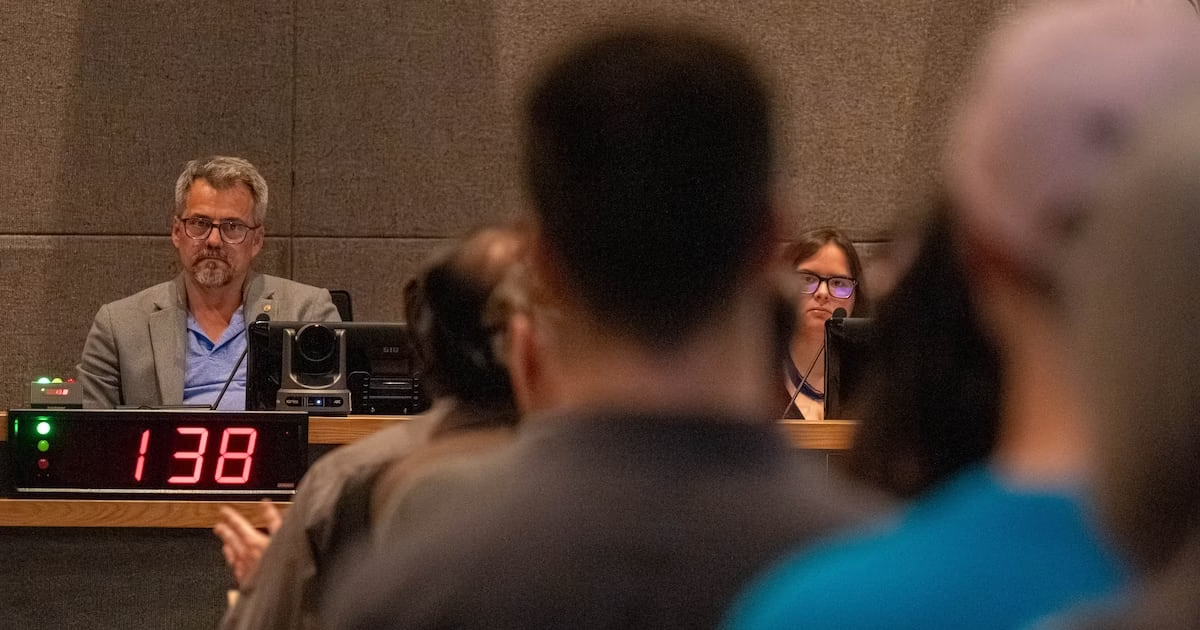
The Anchorage Assembly on Tuesday night voted 7-5 to approve a new measure adding criminal penalties for camping on public lands.
According to supporters, the move is one of many the city is taking to address homelessness, in this case a tougher approach to large, sprawling encampments in parks or near schools, roadways, recreational trails and other sensitive areas.
But critics on the Assembly and members of the public opposing the measure charge that it criminalizes homelessness and is an insufficient solution to the problem.
The measure came out of extensive revisions to the initial proposal after hours of heated public testimony over recent weeks before it passed at the Assembly’s regular Tuesday night meeting. Mayor Suzanne LaFrance proposed a modified version of the measure after a trio of Assembly members initially introduced a broader camping ban in June.
“What we are proposing here is a balanced, targeted approach‚” LaFrance said Tuesday ahead of the vote. “Letting people permanently camp in public places is not safe. It’s not healthy. It’s not a solution.”
The mayor’s version of the measure is what ultimately passed.
It creates two sets of new penalties in the city’s criminal code.
The first establishes a number of “protected premises,” including schools, day cares, playgrounds, streams, roads, recreational trails and others. Camping within several hundred feet of those areas is banned, meaning that if a person sets up a tent there or builds a shelter, they risk police charging them with a misdemeanor. Under the new ordinance, penalties could amount to a fine of up to $500 or time in jail.
“Our goal is intervention and compliance, not arrests,” LaFrance said.
The second piece of the measure makes it a misdemeanor if a person “knowingly engages in the construction, in whole or in part, of any hard-walled, hard-roofed, or hard-floored structure of any kind” on public land. It also bars people from bringing loads of construction material such as “lumber, pallets, boards, logs, bricks, cinder blocks” onto public land that could be used to build improvised shelters.
Proponents say that taken together, the new rules are meant to prevent the kind of sprawling, entrenched encampments that have become common in recent years along Anchorage’s greenbelt. Several members of the Assembly mentioned June’s abatement of camps at Davis Park, some of which had been there for years and generated hundreds of tons of debris, materials and garbage that has since been hauled away at the public’s expense.
“There is an element of illegal camping in our community that has gotten a little bit out of control,” said Daniel Volland, who represents the downtown district and voted in favor of the measure. “Nobody has the right to occupy public land indefinitely. And there are places where camping is never acceptable.”
Volland said that much of the criticism of the ordinance brought up in public testimony framed it as an uncompassionate and inadequate tool for tackling the root causes of homelessness. But the new penalties are not the only tool city leaders are bringing to bear on the problem, he added, running through a long list of spending and policy initiatives undertaken in recent years. It included funding for year-round shelter, more behavioral health programs, specialty police teams, housing programs and support for overnight vehicle parking and tiny home pilot programs.
“From where I sit, any argument that we haven’t worked to address root causes falls flat,” Volland said.

Opposition to the measure came from some of the Assembly’s most progressive-leaning members, and ranged from ideological arguments to concerns about its implementation. Several members pointed out that while the ordinance spells out where people cannot camp or sleep, it does not tell people where they can go if they have no other options or if all the city’s shelter beds are full.
“We are considering an item here that purports to offer compassion even when resources … are clearly unavailable in our community,” said Erin Baldwin Day, who represents the Midtown district. “On the very best of days, we do not have the resources, we do not have the capacity.”
Even with more resources for people wanting to get off the streets, there are not always open spots in overnight shelters or treatment programs that meet people’s needs, she said.
“We are facing an under-resourced system,” said member Felix Rivera, also from Midtown.
Both voted against the ordinance, along with Chair Christopher Constant, Vice Chair Anna Brawley from West Anchorage and member George Martinez from East Anchorage.
Within the debate was disagreement over what the city should do about people living outdoors, often in encampments, who consistently reject options for moving indoors. In the absence of a coherent policy for sanctioning outdoor camping, members testified, the status quo for several years has been lawless camps in the woods or on public parcels that are wildly unsafe.
“Leaving people to die in the woods is not compassion. It is managed neglect,” said Jared Goecker, who represents the Eagle River district. “We cannot keep pretending that an open field in July is a housing plan.”
Members added several minor amendments to the mayor’s version of the measure before it was approved.


Leave a Reply